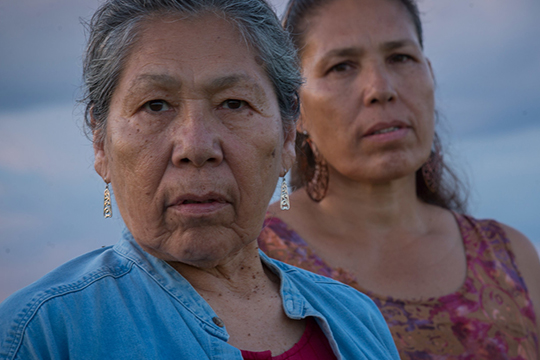| Cast | |
| Key Cast | Madonna Thunder Hawk |
| Key Cast | Marcella Gilbert |
| Crew | |
| Director | Christina D. King, Elizabeth A. Castle |
| Producer | Anna M. Pitman |

Warrior Women
Through a circular indigenous style of storytelling, Warrior Women relates the lifelong struggle of a Lakota mother and daughter in the American Indian Movement’s fight for Native liberation from the 1970s to protesting the Dakota Access Pipeline in Standing Rock, ND in 2016.
The women of the American Indian Movement fight from a vulnerable place only matriarchs can understand. For them, the Movement is a battle for their children and the culture they hope to preserve for them.
Through contemporary interviews, rare archival materials, exclusive verité, and video art, we will experience Madonna Thunder Hawk’s dedication to Red Power – a commitment that often left her daughter Marcy feeling more like her mother’s ‘comrade’ than her child. Through them, we will come to know the emergence of Native ecological sovereignty as two of the Movement’s most determined, and overlooked organizers lived it.
Madonna and Marcy are still at the forefront of modern Native struggles as they set up camp in the summer of 2016 to occupy and protect the Missouri River from the “Black Snake” of the Dakota Access Pipeline. They staff supply tents, stand against water cannons during militarized police attacks, and share knowledge with the next generation of organizers who show up in the thousands chanting the Lakota rallying cry – ‘Mni Wiconi!’ or ‘Water is life!’
During the occupation, Madonna’s personal demons are brought full circle as she knows well what the US Government and corporations can do to the Native way of life along the Missouri River. Back in the 1950s, Madonna’s home was destroyed when the Missouri was dammed by the Army Corps of Engineers to create Lake Oahe on the Cheyenne River and Standing Rock Indian reservation. The intentional flooding left poverty and struggle and dislocation in its wake. Madonna would grow up to channel her anger and pain into a fierce, unwavering dedication to activism. ‘Home’ would be wherever the fight for Indigenous rights took her.
Marcy grew up in the shadows of the movement and was an athletic, sensitive teenager when her mother left to work for AIM. She struggled with her mother’s absence, but also wanted to follow in her substantial footsteps. She got her wish when Madonna organized a group of AIM children under the banner of the “We Will Remember Survival School” and brought Marcy on the road with her.
This rag-tag group of kids flourished with the promise of a new world order of Native Pride but also struggled under the pressure of changing the world.
Their ‘lessons’ at Survival School included lessons about the earth and the environment that had immediate effects on their day-to-day lives, as strip mining contaminated their drinking water with Uranium. In rare archival, the banks of the Missouri, shaded from the the hot afternoon sun under an arbor of leaves, Madonna leads the survival school kids in a group discussion about tribal sovereignty and natural resources. They are camped there as part of the 1976 international indigenous treaty council gathering held on Standing Rock reservation. Madonna’s eleven-year-old son, Phillip, thoughtfully responds that they have to use the treaty to ‘stop the white man from taking the natural resources and taking our water.’
Fast forward forty years later and Madonna is again on the banks of the Missouri with her children standing on treaty rights to protect the water from the pipeline and compel the government to follow its own laws.
Now, Madonna is moving into the twilight of her life, fighting the inevitable slowing that she dreads. As mother and daughter negotiate a transformative stage in both their lives, they find new ways to reconcile their shared past.
Through the eyes of these two Lakota women, we see a female perspective on a crucial chapter in our history, one that sparks questions about what it is to be a warrior and simultaneously a mother; what it means to grow up in the shadow of fierce activism, and how activist legacies are passed down from generation to generation. In Warrior Women, we come to understand, through the deeply personal story of Madonna and Marcy, that activism is not just a news story, a protest or a march; it is woven in the fabric of the lives we lead.
